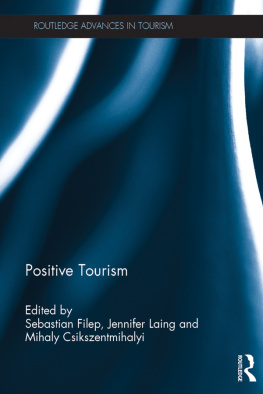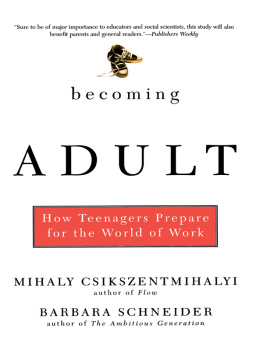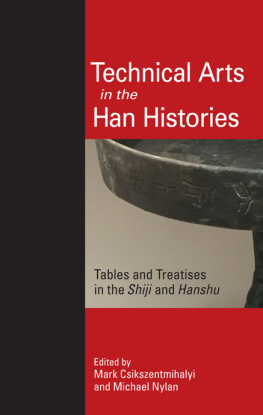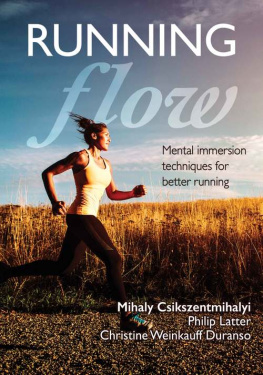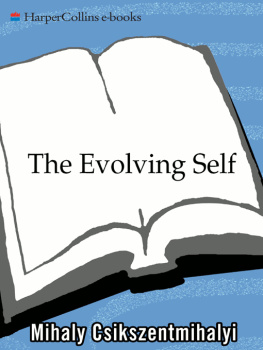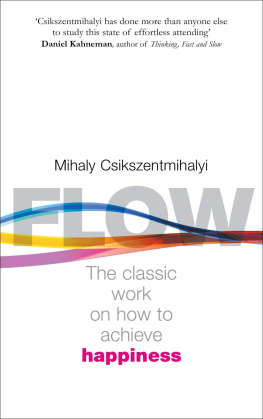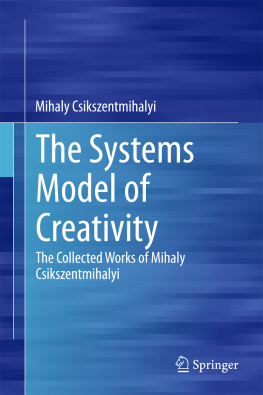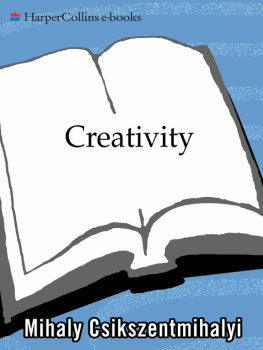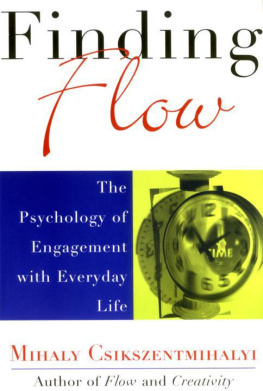Csikszentmihalyi Mihaly - Positive tourism
Here you can read online Csikszentmihalyi Mihaly - Positive tourism full text of the book (entire story) in english for free. Download pdf and epub, get meaning, cover and reviews about this ebook. City: London, New York, year: 2017, publisher: Rouledge, genre: Religion. Description of the work, (preface) as well as reviews are available. Best literature library LitArk.com created for fans of good reading and offers a wide selection of genres:
Romance novel
Science fiction
Adventure
Detective
Science
History
Home and family
Prose
Art
Politics
Computer
Non-fiction
Religion
Business
Children
Humor
Choose a favorite category and find really read worthwhile books. Enjoy immersion in the world of imagination, feel the emotions of the characters or learn something new for yourself, make an fascinating discovery.
- Book:Positive tourism
- Author:
- Publisher:Rouledge
- Genre:
- Year:2017
- City:London, New York
- Rating:3 / 5
- Favourites:Add to favourites
- Your mark:
- 60
- 1
- 2
- 3
- 4
- 5
Positive tourism: summary, description and annotation
We offer to read an annotation, description, summary or preface (depends on what the author of the book "Positive tourism" wrote himself). If you haven't found the necessary information about the book — write in the comments, we will try to find it.
Positive tourism — read online for free the complete book (whole text) full work
Below is the text of the book, divided by pages. System saving the place of the last page read, allows you to conveniently read the book "Positive tourism" online for free, without having to search again every time where you left off. Put a bookmark, and you can go to the page where you finished reading at any time.
Font size:
Interval:
Bookmark:
First published 2017
by Routledge
2 Park Square, Milton Park, Abingdon, Oxon OX14 4RN
and by Routledge
711 Third Avenue, New York, NY 10017
Routledge is an imprint of the Taylor & Francis Group, an informa business
2017 selection and editorial matter, Sebastian Filep, Jennifer Laing and Mihaly Csikszentmihalyi; individual chapters, the contributors
The right of Sebastian Filep, Jennifer Laing and Mihaly Csikszentmihalyi to be identified as the authors of the editorial material, and of the authors for their individual chapters, has been asserted in accordance with sections 77 and 78 of the Copyright, Designs and Patents Act 1988.
All rights reserved. No part of this book may be reprinted or reproduced or utilised in any form or by any electronic, mechanical, or other means, now known or hereafter invented, including photocopying and recording, or in any information storage or retrieval system, without permission in writing from the publishers.
Trademark notice: Product or corporate names may be trademarks or registered trademarks, and are used only for identification and explanation without intent to infringe.
British Library Cataloguing in Publication Data
A catalogue record for this book is available from the British Library
Library of Congress Cataloging-in-Publication Data
Names: Filep, Sebastian, author. | Laing, Jennifer, 1967- author. |
Csikszentmihalyi, Mihaly, author.
Title: Positive tourism / edited by Sebastian Filep, Jennifer Laing and
Mihaly Csikszentmihalyi.
Description: Abingdon, Oxon ; New York : Routledge, is an imprint of the
Taylor & Francis Group, an Informa Business, [2017] | Series: Routledge
advances in tourism | Includes bibliographical references and index.
Identifiers: LCCN 2016020675| ISBN 9781138900653 (hbk) |
ISBN 9781315707129 (ebk)
Subjects: LCSH: Tourism. | TourismSocial aspects.
Classification: LCC G155.A1 P67 2017 | DDC 338.4/791dc23
LC record available at https://lccn.loc.gov/2016020675
ISBN: 978-1-138-90065-3 (hbk)
ISBN: 978-1-315-70712-9 (ebk)
Typeset in Times New Roman
by Apex CoVantage, LLC

Waiting in line to enter a new country or continent is a familiar experience for international travellers. Provided the right visas have been obtained and the background checks enacted by the gatekeeper reveal no nasty surprises, entry is usually straightforward. Then the pleasures of the visit begin. One can conceptualise positive tourism as an aspiring traveller, waiting to be accepted into the country of legitimate inquiry. Older relatives, such as tourist behaviour and sustainable tourism, have been given access a long time ago. They are now flourishing in the landscape of legitimate inquiry. But there are rumours that some other relatives, such as hopeful tourism and slow tourism, have been denied immediate access and are still waiting their turn.
Let us examine the case for the acceptance of positive tourism into the country of legitimate inquiry. Initially, a doubt, a possible confusion of identity, needs to be considered. Positive tourism does have a near namesake, positivism, whose style might raise alarm bells in the scrutiny for contemporary legitimacy. Positivism in tourism is an explicit and strong-minded adherence to an etic research approach. It is buttressed by a realistic ontology with an epistemology that demands a tight adherence to measured facts. It can be found cohabiting with tourism economics. This is not the heritage nor the growth path of the younger positive tourism. Instead, positive tourism, which is fundamentally about seeking to understand human well-being in the context of tourism and travel, has a highly prestigious family background.
In the last 15 years, positive psychology with an explicit emphasis on human flourishing has been developed as a solid and well-respected augmentation to long-standing psychology interests in ameliorating individual problems, deficits and difficulties. The research prowess, prestige and influence of the personnel in psychology, all of whom stressed these interests in building greater human happiness and subjective well-being, ensured the rapid international acceptance of positive psychology. Not insignificantly, for the task of establishing the legitimacy of positive tourism, Mihaly Csikszentmihalyi, one of the editors of this volume, is one of these prestigious psychologists.
The alignment of the research concepts and approaches in positive psychology to tourism has now been underway for a decade. The study topics of interest include the fulfilment of complex motivational patterns, the acquisition of skills, the positive emotional states, the durability of the health benefits of travel and the enduring value of tourism-derived memories. These individual concerns are united by the thread exploring the essential question: does tourism improve the life experience of those who travel? The themes of interest for positive tourism are accompanied by concepts and theories which underpin the new interests: mindfulness, flow, acts of kindness, humour, optimism, savouring and the broaden-and-build theory of emotions are examples. Both traditional and new tools to explore positive life-enhancing tourist experiences are appealing credentials in the application to be fully integrated into tourism research efforts. As the volume demonstrates, there are also recent research initiatives that explore positive psychology concepts with host communities and workers in tourism, which extend positive tourism beyond the study of individual tourist experience.
For this researcher, the case is clear. Positive tourism should be welcomed into the land of legitimate inquiry in the tourism field so that it can flourish while studying the very process of human flourishing.
Philip L. Pearce
Foundation Professor of Tourism
James Cook University, Australia.
Deborah Che , Lecturer in the School of Business and Tourism, Southern Cross University, Coolangatta, Australia. Email: deborah.che@scu.edu.au
John Coffey , Visiting Assistant Professor of Psychology in the Department of Psychology, The University of the South, Sewanee, USA. Email: jkcoffey2@gmail.com
Mihaly Csikszentmihalyi , Distinguished Professor of Psychology and Management and Founding Co-Director of the Quality of Life Research Centre, Claremont Graduate University, Claremont, CA, USA. Email: miska@cgu.edu; Mihaly.Csikszentmihalyi@cgu.edu
Jessica de Bloom , Research Fellow in the Institute for Advanced Social Research, Department of Psychology, School of Social Sciences and Humanities, University of Tampere, Finland. Email: jessica.de.bloom@uta.fi
Sebastian Filep , Senior Lecturer in the Department of Tourism, University of Otago, Dunedin, New Zealand. Email: sebastian.filep@otago.ac.nz
Warwick Frost , Associate Professor in the Department of Management and Marketing, La Trobe University, Melbourne, Australia. Email: w.frost@latrobe.edu.au
Sabine Geurts , Professor in the Behavioral Science Institute, Radboud University, Nijmegen, the Netherlands. Email: s.geurts@psych.ru.nl
Chelsea Gill , PhD Candidate in UQ Business School, The University of Queensland, Brisbane, Australia. Email: c.gill@uq.edu.au
Troy D. Glover , Professor in the Department of Recreation and Leisure Studies, University of Waterloo, Waterloo, Canada. Email: troy.glover@uwaterloo.ca
Peita Hillman , Lecturer in the School of International Tourism and Hospitality, International College of Management, Sydney (ICMS), Manly, Australia. Email: phillman@icms.edu.au
Susan Houge Mackenzie , Assistant Professor in Recreation, Parks, & Tourism Administration, California Polytechnic State University, San Luis Obispo, USA. Email: mackenzi@calpoly.edu
Font size:
Interval:
Bookmark:
Similar books «Positive tourism»
Look at similar books to Positive tourism. We have selected literature similar in name and meaning in the hope of providing readers with more options to find new, interesting, not yet read works.
Discussion, reviews of the book Positive tourism and just readers' own opinions. Leave your comments, write what you think about the work, its meaning or the main characters. Specify what exactly you liked and what you didn't like, and why you think so.

